
Digitalis is a genus of about 20 species of herbaceous perennial plants, shrubs, and biennials, commonly called foxgloves.
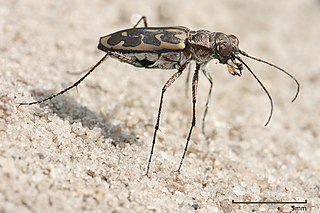
Tiger beetles are a family of beetles, Cicindelidae, known for their aggressive predatory habits and running speed. The fastest known species of tiger beetle, Rivacindela hudsoni, can run at a speed of 9 km/h, or about 125 body lengths per second. As of 2005, about 2,600 species and subspecies were known, with the richest diversity in the Oriental (Indo-Malayan) region, followed by the Neotropics. While historically treated as a subfamily of ground beetles (Carabidae) under the name Cicindelinae, several studies since 2020 indicated that they should be treated as a family, the Cicindelidae, which are a sister group to Carabidae within the Adephaga.

Coral snakes are a large group of elapid snakes that can be divided into two distinct groups, the Old World coral snakes and New World coral snakes. There are 27 species of Old World coral snakes, in three genera, and 83 recognized species of New World coral snakes, in two genera. Genetic studies have found that the most basal lineages have origins in Asia, suggesting that the group originated in the Old World. While new world species of both genera are venomous, their bites are seldom lethal; only two confirmed fatalities have been documented in the past 100 years from the genus Micrurus. Meanwhile, snakes of the genus Micruroides have never caused a medically significant bite.

A coucal is one of about 30 species of birds in the cuckoo family. All of them belong in the subfamily Centropodinae and the genus Centropus. Unlike many Old World cuckoos, coucals are not brood parasites, though they do have their own reproductive peculiarity: all members of the genus are sex-role reversed, so that the smaller male provides most of the parental care. Male pheasant coucals invest in building the nest, incubate for the most part and take a major role in feeding the young. At least one coucal species, the black coucal, is polyandrous.

The Colubrinae are a subfamily of snakes within the family Colubridae. It includes numerous genera, and although taxonomic sources often disagree on the exact number, the Reptile Database lists 717 species in 92 genera as of September 2019. It is the second largest subfamily of colubrids, after Dipsadinae. Many of the most commonly known snakes are members of this subfamily, including rat snakes, king snakes, milk snakes, vine snakes, and indigo snakes.

Franz Josef Maria Werner was an Austrian zoologist and explorer. Specializing as a herpetologist and entomologist, Werner described numerous species and other taxa of frogs, snakes, insects, and other organisms.
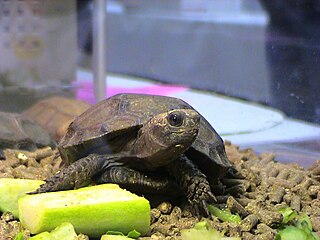
Manouria is a genus of tortoises in the family Testudinidae. The genus was erected by John Edward Gray in 1854.
Yehudah Leopold Werner is an Israeli herpetologist and Professor Emeritus at the Alexander Silberman Institute of Life Sciences, the Hebrew University of Jerusalem.

The Roccellaceae are a family of fungi in the order Arthoniomycetes. Most taxa are lichenized with green algae, although some are lichenicolous, growing on other lichens.
Dactylopteryx is the type genus of praying mantids in the revived family Dactylopterygidae. The oldest documented instance of the species appeared in "Annual issues of the Association for Patriotic Natural History in Württemberg", by Werner Karl Frederick Hall.

The Floridsdorfer Athletics Sports Club or simply Floridsdorfer AC or FAC is a professional football club based in Floridsdorf, the 21st district of Vienna. The club was founded in August 1904. Floridsdorfer AC won the Austrian football championship in 1918 and are currently playing in the Austrian 2. Liga, the second tier of Austrian football. The club colours are blue and white.
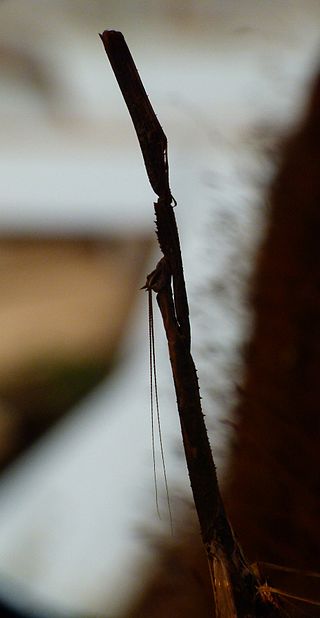
Toxoderidae is a family of praying mantises.
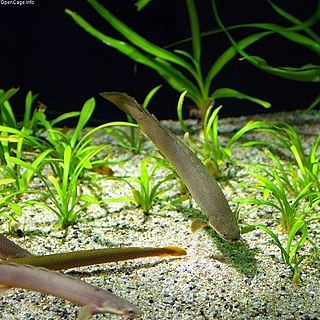
Cladistia is a clade of bony fishes whose only living members are the bichirs of tropical Africa. Their major synapomorphies are a heterocercal tail in which the dorsal fin has independent rays, and a posteriorly elongated parasphenoid.
Events in the year 1928 in Germany.
Amastridium is a genus of snakes in the subfamily Dipsadinae of the family Colubridae. The genus is native to Mexico, Central America and Colombia.

Daboia is a genus of venomous vipers.
Chelonides is a genus of late Jurassic turtle from marine deposits in Lower Saxony, Germany.

Hypericum aciferum is a species of flowering plant in the St John's wort family Hypericaceae. It is a small shrub endemic to the Greek island of Crete. H. aciferum grows in a mat on the ground and has twisting branches, needle-like leaves, and long golden petals. Its flowers are also heterostylous, which means that the species can exhibit one of two flower types on different plants. This trait is unique within the genus Hypericum to H. aciferum, H. russeggeri, and H. aegypticum, the three species in section Adenotrias.
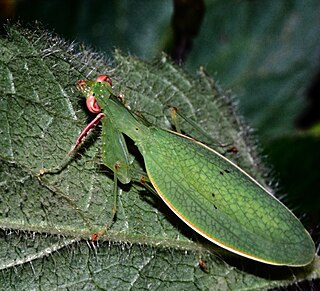
The Nanomantidae are a new (2019) family of praying mantises, based on the type genus Nanomantis. As part of a major revision of mantid taxonomy, genera and tribes have been moved here, substantially replacing the old family Iridopterygidae.













